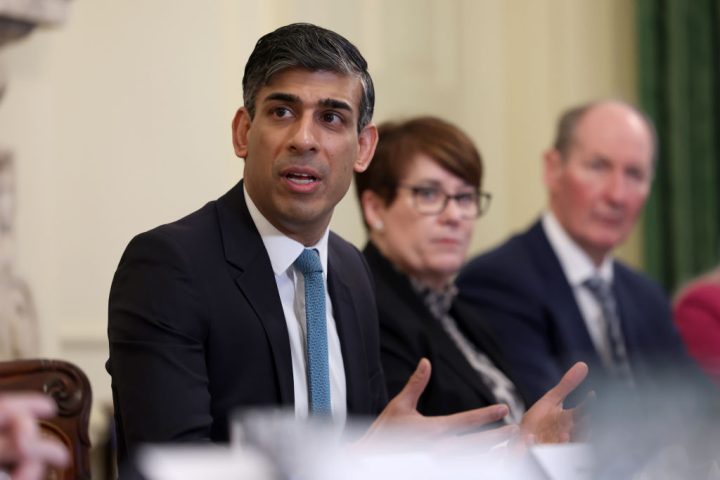And so Keir Starmer’s bad week comes to an end, just like that. Labour has won two by-elections in a single night in seats that had Tory majorities of over 10,000 after the 2019 general election. The heat now returns to Rishi Sunak, as inevitably it was always going to.
To be fair, no one expected the results of these by-elections to be any different. For that we should credit No. 10 with decent expectation management, if nothing else. In fact, let’s not credit No. 10 with anything else here: most of the way these by-elections were run looked shambolic from beginning to end. There are many things to pick on, yet in a week where Labour has been lambasted for its poor candidate choice in the upcoming Rochdale by-election (fairly, it must be added here), the Tories decided that picking the girlfriend of the MP who had to resign from one of these seats after a scandal was a good idea.
The Tories need to keep hope alive somehow in the face of results which imply a huge general election loss
The Kingswood by-election loss will be a painful one for the Conservative party for several reasons. The first is that it didn’t really need to happen. It was the result of hubris in the wake of the Uxbridge by-election victory last July, one that in retrospect the Tories should have chalked up to luck and good local campaigning and left it at that. Instead, they decided the anti-Ulez messaging could be rolled out nationwide. In the ensuing revolt against anything Net Zero related, Chris Skidmore resigned and caused this by-election to occur. It was an unforced error by Sunak.
But taken in isolation, at least the party can console itself that the loss in Kingswood wasn’t as bad as might have been expected. They can look at Labour’s 10 per cent majority and perhaps, in their most optimistic mood, feel like that’s winnable at the next election. The swing against the Tories here, combined with where Kingswood would have sat in the Labour target list, implies only a thin Labour majority, one No. 10 might feel could be turned into a hung parliament with a great election campaign.
However, it’s much harder for the Tories to find any consolation in the Wellingborough by-election result. The swing here was a massive 28.5 per cent, with Labour securing 46 per cent of the vote. This should be a safe Tory seat and indeed, it has been one since 2010. It was only a Labour constituency following the 1997 and 2001 general elections at the very height of New Labour’s reign, and even then, it was only held with thin majorities both times (they won it in 1997 with a tiny majority of 187 votes). The toppling of Wellingborough, with an eye-watering majority of 6,436 on a 38 per cent turnout, really does feel like the end of an electoral era for the Tories and the passing of the torch to new New Labour.
This is because Wellingborough implies something much worse for the Conservative party than Kingswood. It seems to suggest that not only are the national polls and seat predictions putting the Tories in wipe-out territory after the next general election, possibly down to below 100 seats, largely correct, they may even be understating the size of loss the governing party is facing. If this by-election result was replicated nationally, Labour would be looking at 450+ seats and a majority of over 200.
But that won’t happen, right? It couldn’t happen, surely. Spokespeople from both parties will be massively playing the results down today. Labour will because they don’t want complacency to set in, either amongst their supporters or the voting public at large. Having lost four general elections in a row, Starmer and those around him know that the biggest danger they face right now is the assumption that they are going to win a massive majority, destroying the possibility of that result occurring. Meanwhile, the Tories need to keep hope alive somehow in the face of results which imply not only a general election loss, but a huge one. We’ll hear a lot about turnout and the supposedly special circumstances at play in both places; how by-elections are just ‘protest votes’ and everyone will come back to the Tory fold come the real event.
Yet any sober analysis must conclude that Downing Street’s current 80:20 strategy – spending most of their campaigning time and money on the 80 most vulnerable seats the Tories hold currently, while attacking 20 Labour held constituencies – looks remarkably naïve this morning. Those 80 marginal seats look long gone; as for gaining double digit numbers of seats off the Labour party, that feels like a drunken fantasy.
Perhaps the one positive thing Sunak and those around him can take from this double loss is that they need to adjust their election strategy. Forget about the red wall or taking Labour seats, they need to be fighting battles way further down the target list, in places that have 10,000, 15,000, perhaps even 20,000 Tory majorities right now. Places like Kingswood and Wellingborough were like prior to yesterday, in other words.







Comments